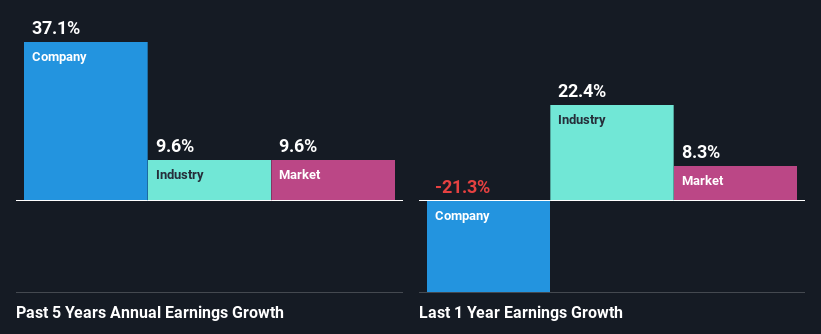Stock Analysis
- Japan
- /
- Food and Staples Retail
- /
- TSE:9919
Kansai Food Market Ltd.'s (TSE:9919) Stock's On An Uptrend: Are Strong Financials Guiding The Market?

Most readers would already be aware that Kansai Food Market's (TSE:9919) stock increased significantly by 32% over the past three months. Given the company's impressive performance, we decided to study its financial indicators more closely as a company's financial health over the long-term usually dictates market outcomes. Particularly, we will be paying attention to Kansai Food Market's ROE today.
Return on equity or ROE is a key measure used to assess how efficiently a company's management is utilizing the company's capital. In other words, it is a profitability ratio which measures the rate of return on the capital provided by the company's shareholders.
View our latest analysis for Kansai Food Market
How Do You Calculate Return On Equity?
The formula for ROE is:
Return on Equity = Net Profit (from continuing operations) ÷ Shareholders' Equity
So, based on the above formula, the ROE for Kansai Food Market is:
9.4% = JP¥6.5b ÷ JP¥70b (Based on the trailing twelve months to December 2023).
The 'return' is the yearly profit. So, this means that for every ¥1 of its shareholder's investments, the company generates a profit of ¥0.09.
Why Is ROE Important For Earnings Growth?
So far, we've learned that ROE is a measure of a company's profitability. Depending on how much of these profits the company reinvests or "retains", and how effectively it does so, we are then able to assess a company’s earnings growth potential. Assuming everything else remains unchanged, the higher the ROE and profit retention, the higher the growth rate of a company compared to companies that don't necessarily bear these characteristics.
Kansai Food Market's Earnings Growth And 9.4% ROE
To start with, Kansai Food Market's ROE looks acceptable. Further, the company's ROE is similar to the industry average of 9.3%. Consequently, this likely laid the ground for the impressive net income growth of 37% seen over the past five years by Kansai Food Market. However, there could also be other drivers behind this growth. For example, it is possible that the company's management has made some good strategic decisions, or that the company has a low payout ratio.
Next, on comparing with the industry net income growth, we found that Kansai Food Market's growth is quite high when compared to the industry average growth of 9.6% in the same period, which is great to see.

Earnings growth is a huge factor in stock valuation. What investors need to determine next is if the expected earnings growth, or the lack of it, is already built into the share price. By doing so, they will have an idea if the stock is headed into clear blue waters or if swampy waters await. If you're wondering about Kansai Food Market's's valuation, check out this gauge of its price-to-earnings ratio, as compared to its industry.
Is Kansai Food Market Using Its Retained Earnings Effectively?
Kansai Food Market's three-year median payout ratio to shareholders is 17%, which is quite low. This implies that the company is retaining 83% of its profits. This suggests that the management is reinvesting most of the profits to grow the business as evidenced by the growth seen by the company.
Besides, Kansai Food Market has been paying dividends for at least ten years or more. This shows that the company is committed to sharing profits with its shareholders.
Summary
Overall, we are quite pleased with Kansai Food Market's performance. Specifically, we like that the company is reinvesting a huge chunk of its profits at a high rate of return. This of course has caused the company to see substantial growth in its earnings. If the company continues to grow its earnings the way it has, that could have a positive impact on its share price given how earnings per share influence long-term share prices. Remember, the price of a stock is also dependent on the perceived risk. Therefore investors must keep themselves informed about the risks involved before investing in any company. To know the 1 risk we have identified for Kansai Food Market visit our risks dashboard for free.
Valuation is complex, but we're helping make it simple.
Find out whether Kansai Food Market is potentially over or undervalued by checking out our comprehensive analysis, which includes fair value estimates, risks and warnings, dividends, insider transactions and financial health.
View the Free AnalysisHave feedback on this article? Concerned about the content? Get in touch with us directly. Alternatively, email editorial-team (at) simplywallst.com.
This article by Simply Wall St is general in nature. We provide commentary based on historical data and analyst forecasts only using an unbiased methodology and our articles are not intended to be financial advice. It does not constitute a recommendation to buy or sell any stock, and does not take account of your objectives, or your financial situation. We aim to bring you long-term focused analysis driven by fundamental data. Note that our analysis may not factor in the latest price-sensitive company announcements or qualitative material. Simply Wall St has no position in any stocks mentioned.
About TSE:9919
Kansai Food Market
Kansai Food Market Ltd. operates supermarket stores in Japan.
Excellent balance sheet average dividend payer.

